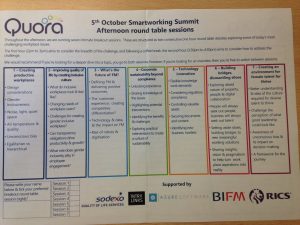Last week was fun. A couple of enjoyable dinners, an interesting day at the BSI KM Standards Committee helping to shape the UK’s response to the latest draft of the emerging ISO KM Standards and a thought provoking day at Quora Consulting’s flagship Smartworking Summit. I will focus on the latter as it impacts the former.
Why are you here?
As I said in answer to that direct question posed to me by one of the speakers during his address:
Because John invited me for which I thank him. I am also here as the discipline I focus much of my time on (Knowledge Management) relies heavily on the right environment to facilitate the sharing of knowledge. Also as a member of the BSI KM Standards Committee which is looking at ISO standards for KM I am keen to seen something in there that reflects the move towards smarter working.
I coud have added that, following the lead of Professor Clive Holtham and Victoria Ward, I have been banging on for a long while about the importance to Knowledge Management of an effective physical environment, it’s one of the indicators I look for when performing a Knowledge Audit or Assessment at any organisation.
The event:
The very well attended senior level event (of the near 200, 75% were C-Suite Directors) was held near St Paul’s and had as it’s focus in the morning “unlocking the full potential of women at work”.
 The afternoon comprised a series of breakout sessions. I went for the “Creating productive workplaces” session facilitated by John Blackwell, Quora’s founder and CEO.
The afternoon comprised a series of breakout sessions. I went for the “Creating productive workplaces” session facilitated by John Blackwell, Quora’s founder and CEO.
As an aside it was nice to see Euan Semple again who was cofacilitating a round table session that draws on an interesting piece of work he is doing and was entitled “Building Bridges, dismantling siloes”.
Interesting fact of the day from Wednesday’s Smartworking Summit – collectively, the registered delegates interact with over 80 million employees on a daily basis – impressive!
Smartworking in context:
Statistics released by the Department of Work and Pensions and The Office of National Statistics are terrifying for the future of the UK economy which has already seen productivity fall by 17% over the last 10 years. These stuck out:
- The UK will need to fill 13.5 million job vacancies in the next ten years but only 7 million people will be leaving schools and universities during that same period. And further, 70% of those graduates will be female.
The Summit’s premise was:
“…there are only two realistic ways of plugging this 6.5 million job vacancy shortfall – encourage people to remain in work beyond the conventional retirement age and crucially, attract far more women into the workplace.”
The morning speakers drawn from some of the UK’s largest employers shared their stories.
I liked:
- The ‘Come Back’ returnee programme for a 12 week period which helps Mums rejoin the organsation after pregnancy leave.
- The carers work programme wherein flexible working hours (often in chunks of 30-60 minutes) are offered to remote workers who look after those incapable of doing so themselves.
- The bottom up shadowing programme wherein senior staff are mentored by young employess on the use of Social Media.
- Anytime, anywhere, any device. The strapline of a programme at a financial services firm who are faciliting a blend of working practices and estimate that 40% of their work will be done flexibly.
- That Cabinet Office and BSI recently launched a Smart Working Code of Practice. PAS 3000 gives recommendations for establishing good practice for the implementation of Smart Working, against which organizations can be benchmarked. It covers changes to working practices, culture, working environments and associated technology.
- The following quotes:
On expecting staff to focus for 8 hours a day: “You can’t leave your life at the door”
On the imposition of a dress code for the office: “How about we trust you to do the right thing? If you look in the mirror and ask whether you can get away with wearing this it’s probably wrong”
On the need to change mindsets: “What the boss does gets copied”; “It’s great to talk, its better to listen”; and “Climbing the greasy pole to reach the corner office”.
I was surprised by:
The results of Quora’s recent survey. Here’s what they said:
We have just released our latest research publication titled “Creating today’s workplaces for tomorrow’s talent”. This study engaged with just short of 3,000 people to explore the correlations between productivity, employee engagement and retention, and amongst its stunning findings are;
- In 1990, 10% of the workforce was over 55. By 2010 that had risen to 26% and, by 2030 the proportion of workforce over 55 will exceed 50%,
- Just 21% stated that the impact of changes at their organisation are tracked and measured.
- Only 33% regard their workplace as optimised for productivity,
- Less than half trusted their manager to do the ‘right thing’ by them,
- 66% stated the main reason for leaving their job was because they ‘found their managers dull and boring’.
Among the conclusions are that workplace design needs considerable fresh scrutiny into the productivity impacts of light intensity and spectrum, daylight, sound amplitude and direction, air quality, air temperature, odour, and occupant location and activity, and provision of quiet space.
Lastly, given that the brain takes 30% of all energy input into the body, the provision of nutrition needs a complete rethink. Considerable attention needs to be given to eating frequent, portion controlled small meals focused on nutritional value.
I am concerned about:
- The rate of commercial redevelopment that is taking place in London. If the workplace of the future is so uncertain and large organisations are consolidating their sites, making workspace more collaborative and shared, who is going to occupy the offices being developed now?
- The scarcity of skilled British workers to fill the impending void at a time when the authorities seem to be making it harder for overseas workers to come to the UK.
- A survey that found only 1:5 believed their leaders would do the right thing.
I took away:
- The notion that the future cv will evolve from being a list of employers to a list of interesting projects and that 75% of new graduates today are predicted to leave within 2 years due to dull management and an unproductive environment.
- The revelation that we now have 4 generations working at the same time so personalisation of approach is really important. Generation Rent employees have vastly different value sets from the Baby Boomer employees.
- The suggestion that the leaders of the future will be Influencers with a focus on outcomes and that some organisations are using Social Network Analysis to identify who they might be.
- The need to manage nutrition as well as the physical and virtual environment of the workforce. Better nutrition and conditioning = better performance in physical activity so why not in the workplace?

- A desire to visit The Edge the greenest most efficient ‘smart’ building in the world when I am in Amsterdam in January. The Edge has proved a big attraction to prospective employees of the building’s tenants who include Deloitte’s.
- The importance of effective knowledge capture and retention to ensure that, whatever technique is used, knowledge from skilled elders gets passed on.
And finally:
Fast forward two days and I am at Chiswick for the BSI Meeting. The first person I meet is someone I heard speak a few years back in Amsterdam at SocialNow.
Dana Leeson is a Digital Workplace Architect at BSI helping to transform  their working practices and environment. One metric they are using: reduce occupancy levels (from 100% usage of the office by their staff to the mid 70’s).
their working practices and environment. One metric they are using: reduce occupancy levels (from 100% usage of the office by their staff to the mid 70’s).
Theirs reflects similar initiatives across UK government who are reducing the number of buildings they occupy and introducing co-working hubs for many departments.
